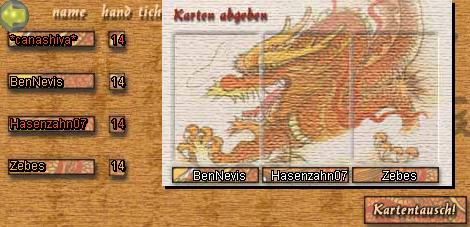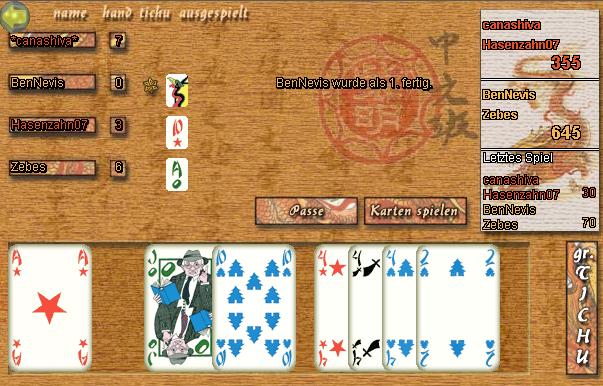Tichu
Tichu (Originalregel)
Starting The Game
With /join 4 players can join the game. With /start the game begins. Alternatively, you can use the Game Tool!
Object of the Game
Tichu is a card game for four people (there are other variations but only the standard 4 player game is on BSW). Two pairs of players work as teams to score the most points. An aim is to play out your cards as quickly as possible while making as many points as possible by taking tricks.
Flow of the game
< p> There are 56 cards in the pack: 2 through Ace in four colors and four special cards (see below). Each player gets 14 cards.The Swap

You must select 3 cards which you will pass to the other players. Drag and drop the cards onto the appropriate positions in the cream window. You will receive three cards from the other players. After the swap your cards can be re-organized by using the right click mouse button (drag and drop).
Playing the Cards

The player with the 1 (the Mahjongg, see below) always starts the round, and may play any valid combination. Click on the cards you wish to play then select "Play Cards".
On your turn, you may either play a higher combination (always using the combination type being played currently on the table) or you can "Pass". You do NOT have to play a higher combination if you have one, especially if your partner was last to play. The following combinations are allowed:
| Combination | Explaination | Winning Combination |
|---|---|---|
| Single | A single card | 1 < 2 < ... Ace < Dragon |
| Pair | A pair | 2-2 < 3-3 < ... < Ace-Ace |
| Triple | 3 of a kind | 2-2-2 < ... < Ace-Ace-Ace |
| Full House | 3 of a kind + a pair | 2-2-2-3-3 < . .. < A-A-A-K-K (The value of the triple is the rank.) |
| Straight | Five or more cards in a run of different suits. | 2,3,4,5,6 (highest card is current best). If a run of 7 was played (e.g. 6,7,8,9,10,J,Q) then a higher run of 7 would need to be played). |
| Stair Steps | 2 or more successive pairs (e.g. 4,4,5,5,6,6) (highest card is current best). If a stair step of 4 was played (e.g. 3,3,4,4,5,5,6,6) then a higher stair step of 4 would need to be played) | The highest pair in the stair steps. |
| Bomb | 4 of a kind or a straight in one suit | 2/ 2/2/2 < ...A/A/A/A < 2/3/4/5/6 < 10/J/D/K/A < 2/3/4/5/6/7 .. . |
When a straight or stair steps are played you can only beat that bid by playing one of the same legth but higher value. So if a run of 6 was played first you could only beat it with a higher run of 6 even if you had a possible run of 8.
Bomb

Bombs are an exception, as they can be played at any time. They can even be played out of turn: if you have an available bomb you will be given a "Bomb it" button which gives you the option at any time to play it and take the lead. You can always play a higher bomb on top of a lower bomb. Higher numbers win and a straight flush (a run in one suit) beats 4 of a kind.
The Special Cards< /span>
The Mahjongg

The Mahjongg (or 1 card) is the smallest card. You can play it at the start of runs or use it as a single. If you have the Mahjongg you must play first, however, it isn't necessary to play this card as your first card/set.
At the time you play the Mahjongg, you may make a wish for any normal card type. This wish is met by the next player who can play the specified card in the required combination for the current trick. If the next player does not have one of these cards he can play normally. The first player who has this card type and can play it legally must do so, even if the only legal combination is a bomb! You can play a bomb which does not include the wish, however the wish will remain still until it is fulfilled.
The Dog

You can only play the dog if you have the lead and no cards have been played. The dog immediately hands the lead to your partner. If your partner has already gone out then the lead is given to the player on your left. If he too has already gone out then it gives the lead back to you. The dog cannot be bombed.
The Dragon

The Dragon is the highest single card (Ace + 1) and can only be played when single cards are called for. If you win the trick with the dragon you must pass the trick to one of your opponents. You decide who gets it.
The Phoenix

The Phoenix is a wild card. It can be used to replace any normal card in any combination, however it cannot be used in a bomb! As a single card the Phoenix ranks ½ point higher than the last card played. If it is played as the lead then it is worth 1½. The phoenix cannot beat the dragon as a single card, as its maximum value is Ace + ½.
End of the Round
The round ends once three players have played all their cards. 100 points are then distributed between the two teams. The player who did not manage to go out gives his cards/tricks to the player who went out first. Remaining cards in hand go to the other team.
Cards are scored as follows:
| Card | Points |
|---|---|
| 5 | 5 |
| 10< /td> | 10 |
| King | 10 |
| Volcano | 25 |
| Phoenix | -25 |
| All others | 0 |
If one team goes out 1st and 2nd then the round finishes with a 200 point victory.
Announcing Tichu

Any player can announce "Tichu" before they play their first card. If that player manages to go out first then he wins an extra 100 point bonus for his team. If he fails then his team loses 100 additional points.
If you feel that your hand is a certainty (the norm is that after 9 cards have been delt!) you can bid "Grand Tichu".

When set, players will be given an option after 8 cards have been dealt (prior to a further 6 to make the 14 in the hand). A Grand Tichu is worth +/-200 points, depending on whether you go out first or not.
End of the Game
The game ends as soon as one team reaches 1000 points.
Game Options
round X
X number of rounds can be set prior to the start. The game ends once game starts. 2 will become 3 and 3 become 2.
tournament (tournament)
In tournament mode 9 rounds are played. Each player plays with each other player three times as a team.
For each game won each player in the winning team gets two points. For a game which went 50:50 then every player gets 1 point. Points for Tichu are also given.
When two players from the same team go out first, they both get 3 points and 100 (not 200!) Tichu points. The losers get nothing. Points for Tichus are then added to the total of the Tichupoints.
Special case: if a team finishes 1st and 2nd as well as the 2nd player NOT making a Tichu bid, they get two points each. The other team gets nothing.
"Grand Tichu" cannot be called in Tournament Tichu.
The winner is the one with the most points at the end of 9 rounds. If there is a tie then it is decided on the number of Tichu points.

